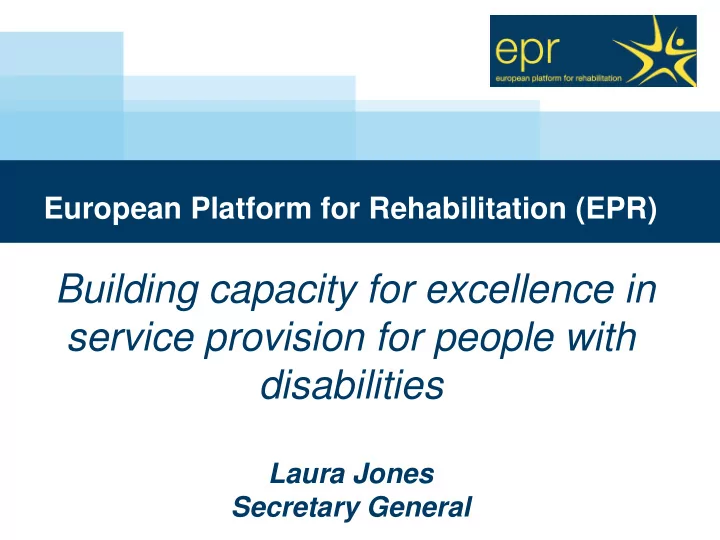

European Platform for Rehabilitation (EPR) Building capacity for excellence in service provision for people with disabilities Laura Jones Secretary General
Who we are Network of service providers committed to excellence and innovation through mutual learning 25 members (full & associate) 16 countries Slovenia: URI All types of disability Public and private not-for-profit
Our vision EPR and its members contribute to a society where every person with a disability and persons in other vulnerable situations have access to the highest quality services that create equal opportunities for all and independent participation in society.
Policy Projects Networking Innovation Benchlearning
Fields of work – service domains Vocational Education and Training Employment Medical rehabilitation Independent living
Fields of work - crosscutting Quality of services Organisational performance Outcome Measurement Mental Health Information and Communication Technologies (ICT) and Assistive Technologies (AT) International Classification of Functioning (ICF) Person centredness / Co-production
SIQOL Domains & Dimensions: Benchmark outcomes of VR programmes as perceived by service users & impact on Quality of Life
EPR specific employment work In-depth mutual learning workshops on partnerships with employers – guide to come Training for job coaches in Supported Employment Webinars on the transition from sheltered work to mainstream labour market Recommendations on employment and training for people with disabilities
Project www.re-integrate.eu E-learning Course Training Needs Analysis Questionnaire Organisational Practice Questionnaire Cost-Benefit Calculator Corporate Profiles
Some success factors in mainstream employment of pwd Informing employers about support And the benefits (Graeme to elaborate!) Knowledge of labour market and trends Employers = customers and partners Relationships, networking, marketing Variety in engagement – building relationships Flexibility in workplace integration Employment coordinators
Reasonable accommodation: origins* 1964: North America, religious beliefs Prohibition of discrimination 1990: Americans with Disabilities Act – reasonable accommodation unless “undue hardship” = “action requiring significant difficulty or expense” *http://ec.europa.eu/justice/discrimination/files/reasonable_accommodation_beyond_disability _in_europe_en.pdf
Reasonable accommodation: EU Employment Equality Directive 2000 Based on principle of non-discrimination, equality Social model of disability “Appropriate measures” unless a “ disproportionate burden ” not addressed by the national govt, + positive action Some: need clearer definition EU level Others: up to national govt
EU case law example; EDF analysis 2006 Person, due to sickness was fired after could not work for some time Judgement: employer cannot dismiss employee on grounds of disability where employee would be able be “competent, capable and available to perform the essential functions of his post ” if reasonable accommodation were made.
Reasonable accommodation: UNCRPD 2006 Convention and optional protocol Signatories: must “ensure [it] is provided” Promotes development of assistive technologies “ Necessary & appropriate modification & adjustments not imposing a disproportionate or undue burden” Denial = discrimination http://ec.europa.eu/justice/discrimination/files/reaso nable_accommodation_in_employment_final2_en.
European Commission legal analysis Reasonable accommodation for disabled people in employment The law and its implementation, including in national laws Guidance and awareness raising Financial assistance for employers Accessibility-enhancing legal requirements and their relationship with reasonable accommodation http://ec.europa.eu/justice/discrimination/files/reasonable_accommodatio n_in_employment_final2_en.pdf
European Parliament study 2015 Types Assistive technologies Physical adjustments Working hours Work assistance Training Great diversity across EU - examples http://www.europarl.europa.eu/RegData/etudes/STUD/2015/536295/IPOL_STU%2 82015%29536295_EN.pdf
ILO practical guide 2016* 1. Identify measures that could remove barriers - allow to perform essential functions 2. Assess if reasonable - cost; turnover of whole company - benefit more than individual? - public funding? - health & safety impact? (Risks?) - length of contract Accessibility? General measures (not individual) And much more … * http://www.ilo.org/global/topics/equality-and- discrimination/WCMS_536630/lang--en/index.htm
Thank you for your attention! ljones@epr.eu www.epr.eu Twitter @EPR_Network Facebook EPR.Brussels
Recommend
More recommend